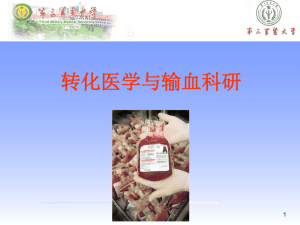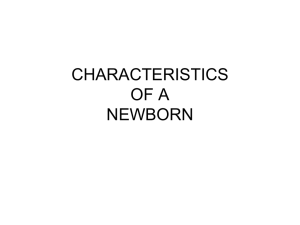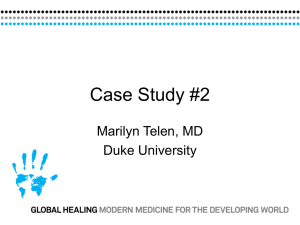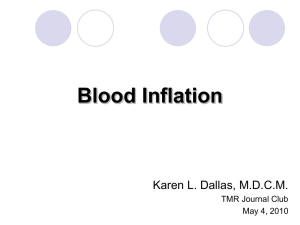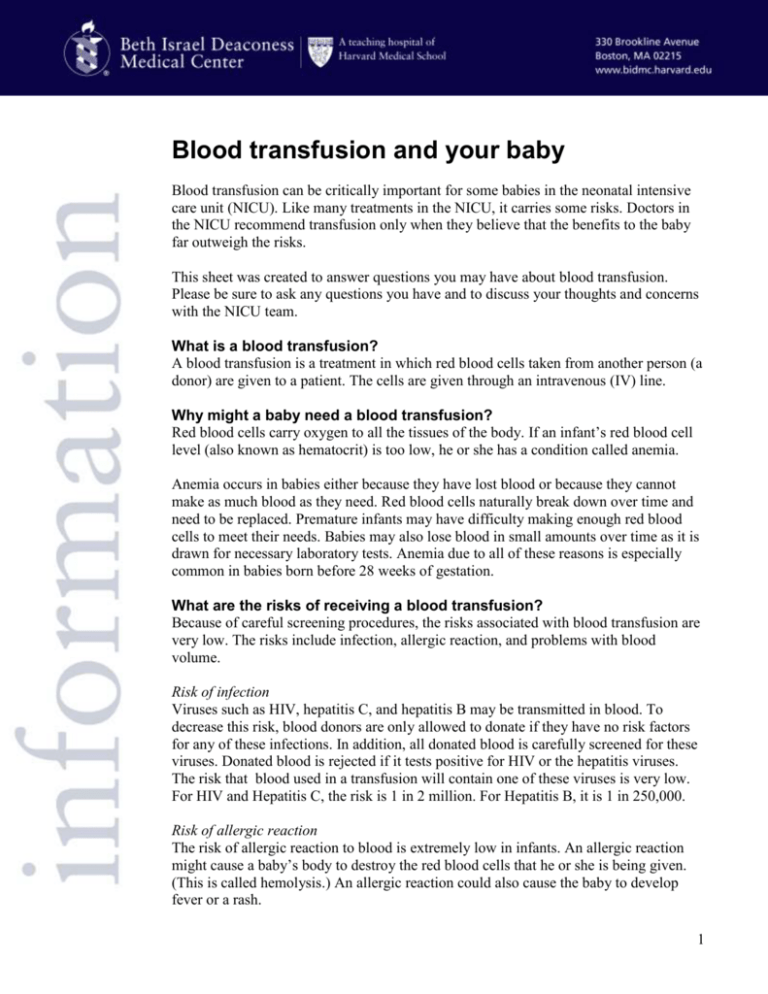
Blood transfusion and your baby
Blood transfusion can be critically important for some babies in the neonatal intensive
care unit (NICU). Like many treatments in the NICU, it carries some risks. Doctors in
the NICU recommend transfusion only when they believe that the benefits to the baby
far outweigh the risks.
This sheet was created to answer questions you may have about blood transfusion.
Please be sure to ask any questions you have and to discuss your thoughts and concerns
with the NICU team.
What is a blood transfusion?
A blood transfusion is a treatment in which red blood cells taken from another person (a
donor) are given to a patient. The cells are given through an intravenous (IV) line.
Why might a baby need a blood transfusion?
Red blood cells carry oxygen to all the tissues of the body. If an infant’s red blood cell
level (also known as hematocrit) is too low, he or she has a condition called anemia.
Anemia occurs in babies either because they have lost blood or because they cannot
make as much blood as they need. Red blood cells naturally break down over time and
need to be replaced. Premature infants may have difficulty making enough red blood
cells to meet their needs. Babies may also lose blood in small amounts over time as it is
drawn for necessary laboratory tests. Anemia due to all of these reasons is especially
common in babies born before 28 weeks of gestation.
What are the risks of receiving a blood transfusion?
Because of careful screening procedures, the risks associated with blood transfusion are
very low. The risks include infection, allergic reaction, and problems with blood
volume.
Risk of infection
Viruses such as HIV, hepatitis C, and hepatitis B may be transmitted in blood. To
decrease this risk, blood donors are only allowed to donate if they have no risk factors
for any of these infections. In addition, all donated blood is carefully screened for these
viruses. Donated blood is rejected if it tests positive for HIV or the hepatitis viruses.
The risk that blood used in a transfusion will contain one of these viruses is very low.
For HIV and Hepatitis C, the risk is 1 in 2 million. For Hepatitis B, it is 1 in 250,000.
Risk of allergic reaction
The risk of allergic reaction to blood is extremely low in infants. An allergic reaction
might cause a baby’s body to destroy the red blood cells that he or she is being given.
(This is called hemolysis.) An allergic reaction could also cause the baby to develop
fever or a rash.
1
Babies receiving blood are watched very closely for any signs of allergy. The
transfusion is stopped if any concerns arise.
Problems with blood volume
Giving red blood cells increases the volume of fluid in the baby’s body. Some babies
might have trouble handling the extra fluid. These infants can be treated with a
medication to help them eliminate the extra fluid in their urine.
What will happen if my baby needs a blood transfusion?
Except in emergencies, blood transfusions are only given to babies after discussion with
the baby’s parents. If your baby needs a transfusion, a member of your baby’s medical
team will talk to you about the risks and benefits described in this pamphlet and ask you
to sign a consent form for transfusion.
The blood for transfusion comes from the BIDMC blood bank, which receives most of
its supply of blood from the American Red Cross. (The BIDMC blood bank does not
operate a volunteer donor center.) The blood from the American Red Cross is collected
from volunteers who are not paid for their donation.
Donated blood is collected in bags called “units.” Adults who need transfusions may
receive one or more full units of blood. But when a baby is transfused, he or she
receives much less than a whole unit of blood. After a transfusion, the remaining blood
from that unit is saved for the baby. If the baby needs another transfusion later, he or
she can be given blood from the same unit. So even though babies in the NICU may
need several transfusions, they are usually only exposed to one donor’s blood.
What is directed donation?
Directed donation is when someone donates blood specifically for use by another
person. (This is only possible when the donor’s blood type and other factors match
those of the person needing the transfusion.) Some parents ask about directed donation
for their babies; they think they would feel more comfortable knowing their baby is
receiving blood from a relative or friend.
Is directed donation recommended for my baby?
The NICU team at BIDMC believes that there are no medical benefits and that there
may be risks to directed donation. Therefore, we generally do not recommend that you
explore directed donation for your baby.
Here are the some of the reasons our team does not recommend this procedure.
No clear advantage
There are no medical advantages to directed donation blood. It may seem safer to
families for their infant to receive blood from someone that they know. However,
multiple research studies have shown that blood obtained from directed donation is no
less likely to transmit infection than volunteer donor blood from the blood bank. In fact,
2
some studies have shown that blood from directed donation has a higher rate of being
positive for some viruses than volunteer donor blood.
Delay
A directed donation must be coordinated by the American Red Cross. The Red Cross
needs about 5-7 days to process the donated blood and send it to BIDMC to be given to
your baby. Blood previously received from volunteer donors is available to your baby
right away.
High potassium
All blood must be irradiated to kill white blood cells that may be present before it can
be given to babies. The BIDMC blood bank does this immediately before sending the
blood up for transfusion into a baby. When the American Red Cross processes a
directed donation for an infant, its internal procedures require that the blood be
irradiated before being sent to the hospital. When there is a longer time between
irradiation and transfusion, the potassium concentration in the blood rises. If the
potassium reaches a very high level, it can cause harm to your baby.
Unusable blood
Even if the person who wants to donate blood is the same blood type as your baby, the
donated blood may not be usable. Blood between a donor and a patient must “match” in
a variety of ways – not just by blood type. The donor’s blood may have proteins or
other substances that do not match those of your baby. Also, blood given by directed
donation is screened for infection, just like volunteer donor blood. If the directed donor
blood is positive for hepatitis or HIV, it cannot be given to your baby. (Some people
have these viruses and do not know they have them.)
Cost
Because directed donation blood has not been shown to be safer than volunteer blood
bank blood, insurance companies will not pay for a directed donation. The American
Red Cross charges donors about $200 per unit donated for the testing and processing of
the blood.
Effects on future treatments
In the extremely unlikely event that your baby should ever need a bone marrow
transplant later in life (to treat cancer or a blood disorder), he or she would not be able
to get a transplant from a person who had given him or her a directed blood donation.
How does one make a directed donation?
If, after considering the above information, you still wish for your baby to receive
directed donor blood, directed donations can be made through the American Red Cross.
An appointment can be made at one of their locations in Dedham, Peabody, Worcester,
or Springfield by calling 800-552-0026. Staff at the center will provide additional,
important information about directed donation and will tell you what you need to do to
proceed.
3
Please note, mothers may not donate blood to their babies for at least six weeks
following the delivery, and must have permission from their obstetrician saying that it is
safe for them to donate.
If my baby is not getting directed donation, what can I tell my friends and
family who really want to donate blood?
The American Red Cross welcomes new donors who may be prompted to donate blood
in honor of a sick relative or friend. Blood donated in honor of your baby would help
increase the supply of blood available to all patients in need. More information is
available at www.givelife.org, or by calling 1-800-448-3543.
We hope this information has been helpful. We understand how difficult it can be to
make decisions regarding your baby’s care. Please do not hesitate to ask any questions
or raise any concerns you have about blood transfusion or any other aspect of your
baby’s care.
This material was prepared by clinicians in neonatology and the blood bank at Beth Israel Deaconess Medical Center. It is
produced and distributed by the Beth Israel Deaconess Learning Center. © 2008, Beth Israel Deaconess Medical Center. All rights
reserved. MC1641 05/08
4





